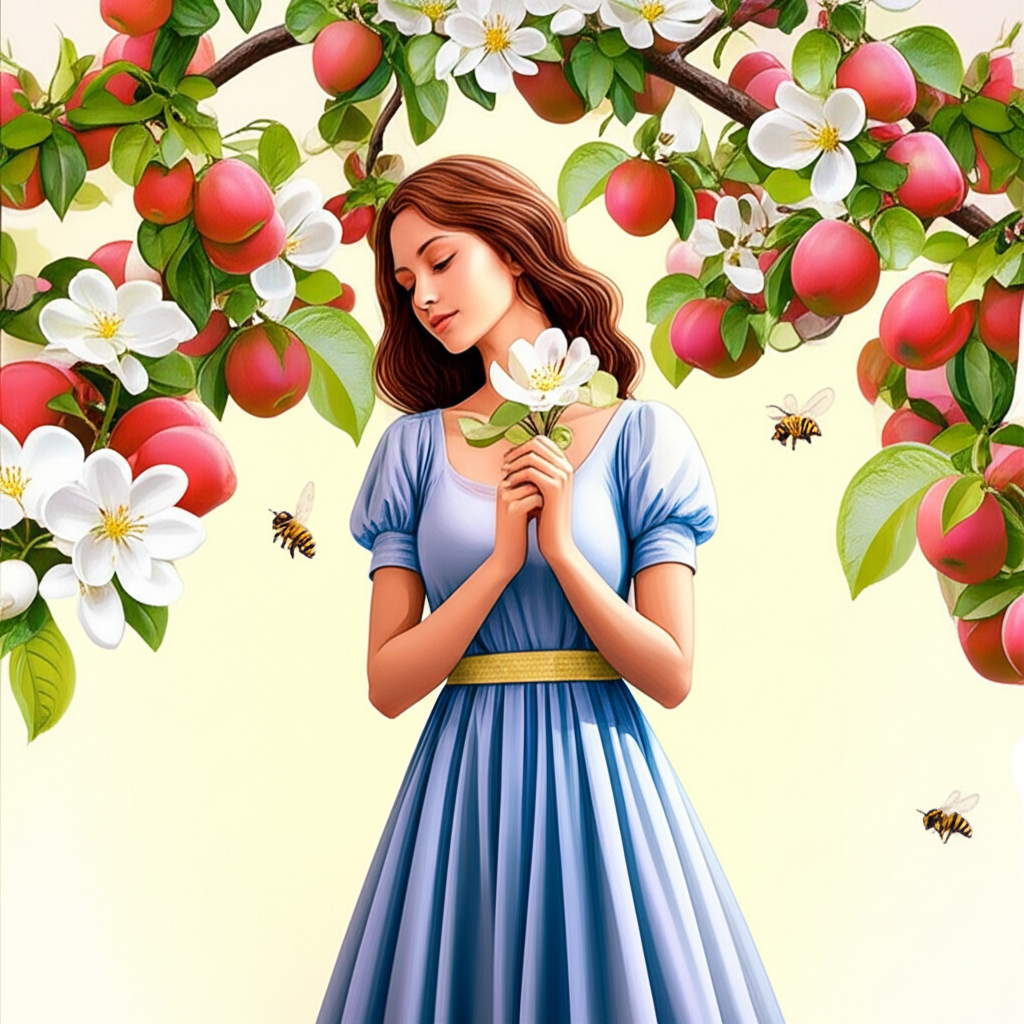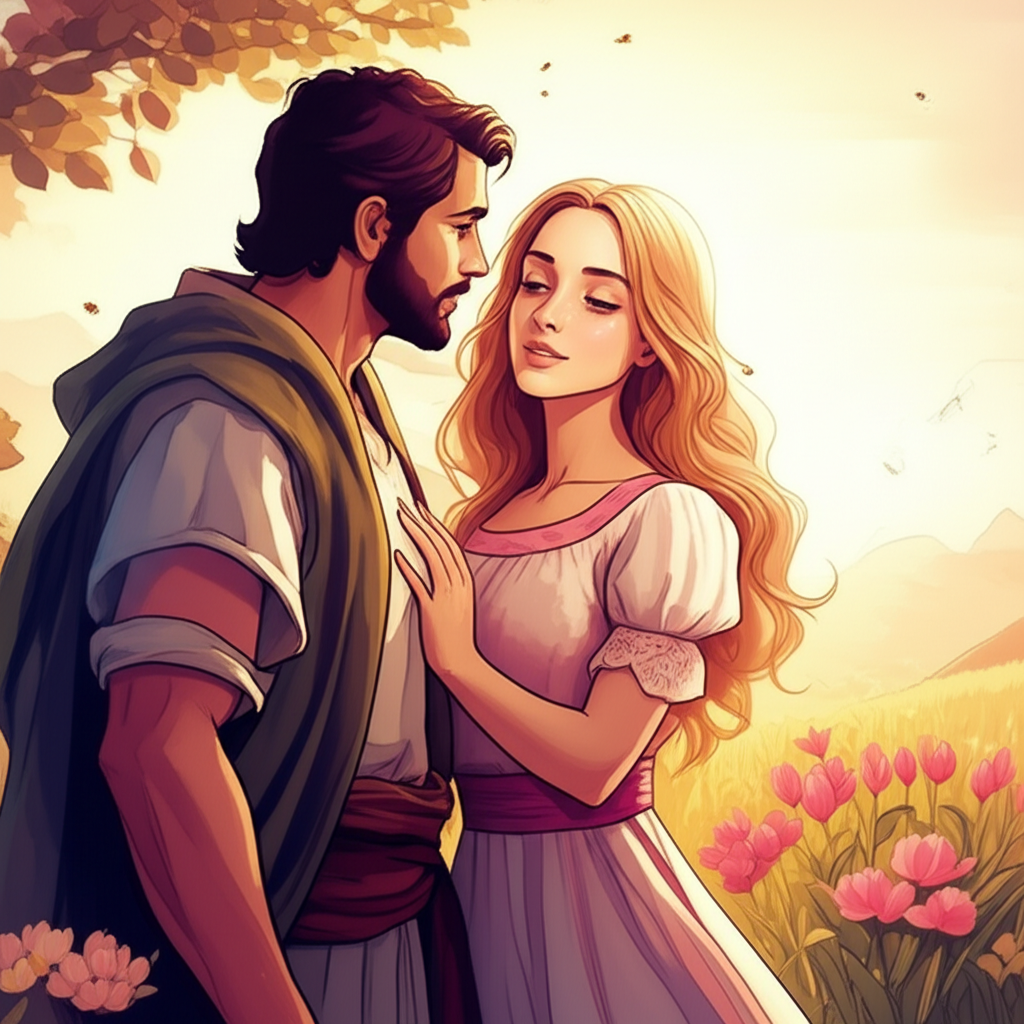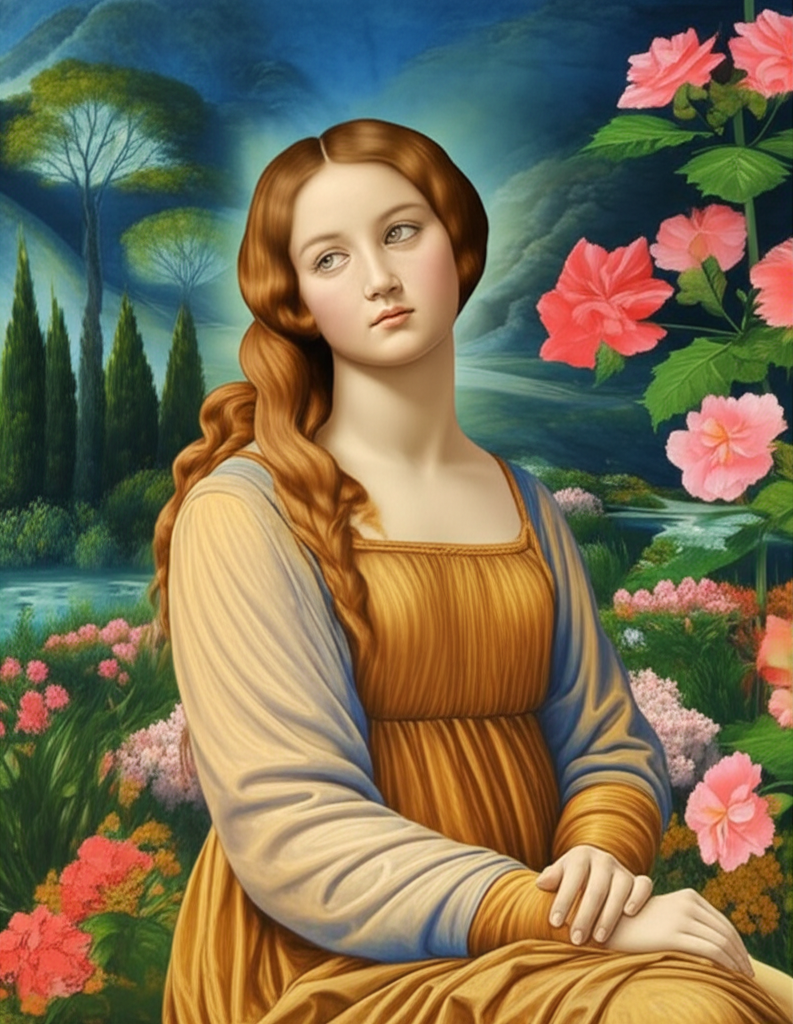Song Of Solomon 2 meaning explained in AI Summary
Chapter 2 of the Song of Solomon continues to explore the themes of love, desire, and the beauty of nature. The woman describes her beloved as a flower among thorns and a lily among lilies. She expresses her longing for him and her desire to be with him in the cool of the day.
The man responds by comparing the woman to a rose and a lily of the valleys. He expresses his desire to be with her in the fields, enjoying the beauty of nature together.
Meaning and Significance
- The Beauty of Nature: The references to flowers, valleys, and the cool of the day evoke the beauty and serenity of the natural world, often associated with love and romance.
- The Power of Love: The intense longing and desire expressed by both the man and woman highlight the powerful and transformative nature of love.
- The Harmony of Nature and Love: The connection between the natural world and the love between the man and woman suggests that love is a natural and harmonious part of human existence.
Application
- Appreciation for Beauty: This chapter encourages us to appreciate the beauty of both nature and human love.
- Longing and Desire: It reminds us of the powerful emotions of longing and desire that can be experienced in love.
- The Harmony of Nature and Human Connection: The chapter suggests that there is a deep connection between the natural world and human relationships.
Overall, Chapter 2 of the Song of Solomon continues to celebrate the beauty and power of love, using vivid imagery and poetic language to convey the depth of the emotional connection between the two lovers.
Song Of Solomon 2 bible study ai commentary
This chapter is a poetic dialogue expressing the deepening love and intimacy between the Shulamite woman and her beloved. It moves from expressions of mutual admiration and the security of their love to a description of longing during a period of separation. Through rich natural imagery, particularly the arrival of spring, it portrays love's newness, beauty, and the eager anticipation of reunion, all while being underscored by a warning against awakening love before its proper time.
Song Of Solomon 2 context
The Song of Solomon is wisdom literature, using love poetry to explore the nature of a monogamous, exclusive relationship. The setting is pastoral and agrarian ancient Israel, with references to shepherding, vineyards, and native flora/fauna (gazelles, figs, grapes). The imagery of spring signifies new beginnings and blossoming love. The recurring phrase "daughters of Jerusalem" likely refers to the young women of the royal court, who serve as a chorus or audience to the couple's romance, learning from their example of patient, pure love.
Song Of Solomon 2:1
I am the rose of Sharon, a lily of the valleys.
In-depth-analysis
- Speaker: This is the Shulamite woman speaking. Her statement is one of humility, not pride.
- Word: She does not say "I am the rose," but "a rose" (chabatstseleth), a common, beautiful flower like a crocus or meadow-saffron found on the coastal plain of Sharon. The same is true for the "lily of the valleys" (shoshanath ha'amaqim).
- Significance: She sees her beauty as natural and belonging to the countryside, not as an exotic, cultivated palace flower. She is lovely but does not consider herself uniquely so. This sets the stage for her beloved's praise in the next verse.
Bible references
- Isaiah 35:1: "...the desert shall rejoice and blossom like a rose." (Links this humble flower to God's promised restoration and renewal, bringing beauty from a lowly place).
- Hosea 14:5: "I will be like the dew to Israel; he shall blossom like the lily..." (The lily as a symbol of God's blessing and the flourishing of His people).
Cross references
- Matt 6:28-29 (lilies and God's providential care); 1 Pet 5:5 (clothe yourselves with humility).
Song Of Solomon 2:2
As a lily among brambles, so is my love among the young women.
In-depth-analysis
- Speaker: The Beloved (the man, Shepherd-King) responds to her humble self-assessment.
- Elevation: He takes her image of being a common lily and elevates it. To him, she is utterly unique and set apart.
- Contrast: The other women are compared to "brambles" or "thorns" (chochim). Thorns are biblically associated with the curse (Gen 3:18), fruitlessness, and that which chokes out life (Matt 13:7). Her beauty and character stand in stark contrast to the world around her.
Bible references
- 2 Corinthians 6:17: "'Therefore go out from their midst, and be separate from them,' says the Lord..." (Illustrates the principle of being holy or "set apart" for a special purpose, just as she is set apart from the "thorns").
- Proverbs 31:29: "Many women have done excellently, but you surpass them all." (The praise of a woman who is uniquely virtuous).
Cross references
- Gen 3:18 (thorns as curse); Heb 6:8 (land of thorns is rejected); Eph 5:27 (Christ presenting the church without blemish).
Song Of Solomon 2:3
As an apple tree among the trees of the forest, so is my beloved among the young men. In his shade I took great delight, and his fruit was sweet to my taste.
In-depth-analysis
- Speaker: The Shulamite reciprocates his praise.
- Uniqueness & Provision: He is like an "apple tree" (tappuach) among useless, non-fruit-bearing forest trees. He offers what others cannot:
- Shade: A place of rest, refuge, and protection from the harsh sun. This is a powerful image of security.
- Fruit: Sustenance, nourishment, and pleasure. His love satisfies her deepest needs.
- Intimacy: "In his shade I sat" implies intentionality and desire. His fruit being "sweet to my taste" is a deeply personal, sensory experience of his love.
Bible references
- Psalm 91:1: "He who dwells in the shelter of the Most High will abide in the shadow of the Almighty." (The "shadow" as a well-known metaphor for God's divine protection and presence).
- Revelation 22:2: "...the tree of life, which bore twelve fruits... the leaves of the tree were for the healing of the nations." (Allegorically, Christ is the ultimate tree providing eternal life and healing).
Cross references
- Psa 17:8 (shadow of Your wings); Eze 17:23 (refuge under a great tree); Gen 3:6 (contrast to the forbidden fruit that was desired but led to death).
Song Of Solomon 2:4
He brought me to the banqueting house, and his banner over me was love.
In-depth-analysis
- Public & Celebratory: The "banqueting house" (beth hayyayin, lit. "house of wine") is a place of celebration, joy, and abundance. Their love is not hidden but is cause for feasting.
- The Banner of Love:
- Word: The "banner" (degel) is a military standard. It identifies which king or commander an army belongs to.
- Significance: His love is her identity, her protection, and a public declaration. She is openly and securely under his care and authority. The conquering, protective power in their relationship is not force, but love.
Bible references
- Psalm 20:5: "May we shout for joy over your salvation, and in the name of our God set up our banners!" (Banners associated with God's victory and name).
- Psalm 23:5: "You prepare a table before me in the presence of my enemies..." (A picture of God's public provision, protection, and vindication, similar to the banner).
Cross references
- Exo 17:15 (The-Lord-Is-My-Banner); Isa 11:10 (the Root of Jesse as a banner for the peoples); Rom 8:37 (more than conquerors through Him who loved us).
Song Of Solomon 2:5
Sustain me with raisins, refresh me with apples, for I am sick with love.
In-depth-analysis
- Overwhelming Love: The experience of his love (v. 4) is so emotionally and physically overwhelming that she feels faint or "love-sick."
- Restoration: She asks for raisins and apples, foods known for being quick sources of energy. This isn't a sign of a flawed love, but of a love so powerful it affects her whole being. It highlights the intensity of their connection.
Bible references
- 2 Samuel 13:1-2: "...Amnon was so tormented that he made himself ill because of his sister Tamar..." (A corrupt, negative parallel showing how desire can lead to sickness, contrasting with the pure love-sickness here).
Cross references
- 1 Sam 30:12 (raisin cakes to revive the faint); Psa 119:131 (panting with longing for God's commands).
Song Of Solomon 2:6
His left hand is under my head, and his right hand embraces me!
In-depth-analysis
- Intimate Support: This verse depicts a posture of tender, supportive, and protective intimacy. The left hand supports her head, and the right hand encircles her.
- Security: She is completely enveloped in his care and affection. It is a portrait of perfect trust and gentle closeness, a direct response to her feeling faint in the previous verse.
Bible references
- Deuteronomy 33:27: "The eternal God is your dwelling place, and underneath are the everlasting arms." (A clear parallel of God's complete and sustaining support for His people).
- Mark 10:16: "And he took them in his arms and blessed them, laying his hands on them." (Christ's tender embrace and blessing of the children).
Cross references
- Isa 40:11 (carries lambs in his arms); SoS 8:3 (verse is repeated, emphasizing its importance).
Song Of Solomon 2:7
I adjure you, O daughters of Jerusalem, by the gazelles or the does of the field, that you not stir up or awaken love until it pleases.
In-depth-analysis
- Central Refrain: This is the first of three times this charge appears in the book (SoS 3:5, 8:4), marking it as a central theme.
- The Adjuration: She makes the court women swear an oath. It's a solemn command about the nature of true love.
- Patience in Love: Love has its own timing. It cannot be forced, manipulated, or rushed. It must be allowed to develop and mature naturally ("until it pleases" or "until it is ready").
- Oath by Nature: Swearing by "gazelles or does" links this principle to the natural world. These animals are beautiful, shy, and swift; they cannot be forced or tamed. Love should be just as free and uncoerced.
Cross references
- Eccl 3:1 ("For everything there is a season, and a time for every matter under heaven."); Hab 2:3 (the vision awaits its appointed time).
Polemics
This stands in direct polemic against the fertility cults of the ancient Near East (e.g., Baal worship) which often involved ritualistic sex and attempts to manipulate divine forces to awaken nature's fertility. The Song insists that true, covenantal love is patient and not subject to human manipulation or premature awakening.
Song Of Solomon 2:8-9
The voice of my beloved! Behold, he comes, leaping over the mountains, bounding over the hills. My beloved is like a gazelle or a young stag. Behold, he stands behind our wall, gazing through the windows, looking through the lattice.
In-depth-analysis
- Scene Change: After the intimate embrace and the solemn charge, the scene shifts. There is now a separation between them.
- Anticipation: She recognizes his "voice" first, showing deep familiarity. He is coming eagerly and powerfully ("leaping," "bounding") overcoming all obstacles ("mountains," "hills").
- Eagerness and Separation: The gazelle/stag imagery emphasizes his strength, speed, and wild desire to be with her. Yet, a "wall" separates them. He is close but not yet with her, peering through the window, trying to catch a glimpse. This builds a powerful tension of longing and imminent reunion.
Bible references
- Malachi 3:1: "Behold, I send my messenger... and the Lord whom you seek will suddenly come to his temple." (Captures the theme of a sudden, eagerly awaited arrival of the Lord).
- Isaiah 59:1-2: "Behold, the LORD's hand is not shortened... but your iniquities have made a separation between you and your God..." (Explains that a wall of separation often exists due to sin, which Christ comes to overcome).
Cross references
- Psa 18:29 (by my God I can leap over a wall); Luke 19:5 (Zacchaeus, where Jesus looks up to see him).
Song Of Solomon 2:10-13
My beloved spoke and said to me: “Arise, my love, my beautiful one, and come away, for behold, the winter is past; the rain is over and gone. The flowers appear on the earth, the time of singing has come, and the voice of the turtledove is heard in our land. The fig tree ripens its figs, and the vines are in blossom; they give forth fragrance. Arise, my love, my beautiful one, and come away.”
In-depth-analysis
- The Invitation: He calls her to leave her enclosure and join him. His call is affectionate ("my love, my beautiful one") and urgent ("Arise... and come away").
- Metaphor of Spring: He grounds his invitation in the changing of seasons.
- Winter is Past: A time of dormancy, cold, and confinement is over.
- Spring has Come: This new season is marked by signs of life and joy: flowers blooming, birds singing (especially the turtledove, a migratory bird heralding spring), and fragrant blossoms on the fig and vine.
- Spiritual Parallel: This is a powerful allegory for salvation or spiritual renewal. He calls her (the believer/church) to leave the "winter" of her old life/sin and step into the new life he offers.
Bible references
- 2 Corinthians 5:17: "Therefore, if anyone is in Christ, he is a new creation. The old has passed away; behold, the new has come." (The definitive statement on the passing of the old and the arrival of the new).
- Isaiah 43:19: "Behold, I am doing a new thing; now it springs forth, do you not perceive it?" (God's announcement of a new work of redemption, mirroring the arrival of spring).
Cross references
- Eph 5:14 ("Awake, O sleeper, and arise from the dead, and Christ will shine on you."); Rev 21:5 ("Behold, I am making all things new.").
Song Of Solomon 2:14
O my dove, in the clefts of the rock, in the hiding places on the mountainside, let me see your face, let me hear your voice, for your voice is sweet, and your face is lovely.
In-depth-analysis
- Call to Vulnerability: He calls her "my dove," a symbol of gentleness, beauty, and faithfulness. But she is in "the clefts of the rock," a place of hiding and refuge. While a rock provides security, it can also be a place of fear or shyness.
- Desire for Presence: He doesn't want her to hide. He longs for full communion—to "see her face" and "hear her voice." This expresses his deep desire for her, not just for her safety, but for her presence.
Bible references
- Exodus 33:22: "and while my glory passes by, I will put you in a cleft of the rock, and I will cover you with my hand until I have passed by." (Moses was placed in the cleft of the rock for protection to experience God's glory. Here, the lover calls her out of the cleft to experience intimacy).
- Psalm 55:6-7: "And I say, 'Oh, that I had wings like a dove! I would fly away and be at rest; yes, I would wander far away; I would lodge in the wilderness.'" (The dove's desire to flee to a place of hiding).
Cross references
- Psa 27:5 (in the secret place of His tent He will hide me); Matt 10:16 (wise as serpents, innocent as doves).
Song Of Solomon 2:15
Catch the foxes for us, the little foxes that spoil the vineyards, for our vineyards are in blossom.
In-depth-analysis
- Shared Responsibility: The voice says "Catch for us," indicating a mutual responsibility to protect the relationship.
- The Threat of "Little Foxes": The relationship is a "vineyard in blossom"—it is beautiful, promising, but also fragile and vulnerable. The "little foxes" represent seemingly small things that can ruin it: minor sins, nagging doubts, unspoken resentments, worldly compromises, or false teachings. They must be dealt with swiftly before they destroy the "fruit."
Bible references
- Nehemiah 4:3: "Tobiah the Ammonite was beside him, and he said, 'Yes, what they are building—if a fox goes up on it, he will break down their stone wall!'" (Foxes as a symbol of forces that mock and seek to destroy what is being built for God).
- Ezekiel 13:4: "Your prophets, O Israel, are like foxes among ruins." (False prophets are compared to destructive foxes that prey on a vulnerable nation).
Cross references
- Gal 5:9 (a little leaven leavens the whole lump); 2 Tim 2:16-17 (godless chatter spreading like gangrene); Isa 5:1-7 (Israel as God's vineyard that was ruined).
Song Of Solomon 2:16
My beloved is mine, and I am his; he browses among the lilies.
In-depth-analysis
- Declaration of Mutual Possession: This is a famous, concise statement of covenantal love. There is no hierarchy here, only mutual belonging. "My beloved is mine" (she possesses him in love), "and I am his" (she belongs to him in love).
- "Browses Among the Lilies": This imagery circles back to verses 1-2. He, the shepherd, finds his pasture and delight "among the lilies," meaning he finds his satisfaction in her and in the beauty she represents. He is content and nourished by their love.
Bible references
- Galatians 2:20: "I have been crucified with Christ. It is no longer I who live, but Christ who lives in me." (The ultimate expression of mutual indwelling between the believer and Christ).
- John 10:14: "I am the good shepherd. I know my own and my own know me." (The shepherd's intimate knowledge and mutual relationship with his sheep).
Cross references
- Hos 2:19-20 (God's betrothal to Israel); 1 Cor 6:19-20 (you are not your own, you were bought with a price); SoS 6:3 (the phrase is later reversed: "I am my beloved's, and my beloved is mine").
Song Of Solomon 2:17
Until the day breaks and the shadows flee away, turn, my beloved, be like a gazelle or a young stag on cleft mountains.
In-depth-analysis
- Longing Through Separation: The chapter ends with an acknowledgement of temporary separation. "Until the day breaks" signifies the passing of the night. She is asking him to "turn" (or return) and be with her again when morning comes.
- Imagery of Eagerness: She again uses the gazelle/stag imagery, asking him to come quickly over the "cleft mountains" (batēr, which can mean mountains of separation). She longs for the "shadows" of darkness, doubt, and distance to flee.
- Eschatological Hope: Allegorically, this is the cry of the Church/believer, living in the "night" of this present age, longing for the "daybreak" of Christ's return, when all shadows of sin and separation will be gone forever.
Bible references
- 2 Peter 1:19: "...as to a lamp shining in a dark place, until the day dawns and the morning star rises in your hearts." (Connects the idea of "day dawning" with the ultimate revelation of Christ).
- Romans 13:12: "The night is far gone; the day is at hand. So then let us cast off the works of darkness and put on the armor of light." (The eschatological daybreak as a motive for holy living).
Cross references
- Rev 22:20 ("He who testifies to these things says, 'Surely I am coming soon.' Amen. Come, Lord Jesus!"); Luke 1:78-79 (the sunrise from on high shall visit us).
Song of Solomon chapter 2 analysis
- Christological Allegory: The entire chapter can be viewed as a rich allegory for Christ and the believer. Christ finds the believer, a humble "lily," and declares her unique among the "thorns" of the world (v.1-2). He is the "apple tree" providing refuge and spiritual nourishment (v.3). His "banner" over the believer is a public declaration of his protective love (v.4). He calls the believer out of the "winter" of their old life into the "spring" of a new creation (v.10-13). He desires intimacy, calling them from their fearful "clefts" (v.14). Together, they guard the relationship against the "little foxes" of sin and doubt (v.15). The relationship is one of mutual belonging ("I am his"), and the believer longs through the "night" of this age for the final "daybreak" of His return (v.16-17).
- The Progression of Love: The chapter maps the development of a secure love. It begins with mutual admiration, moves to a place of celebrated security ("banqueting house"), acknowledges the overwhelming power of love ("love-sick"), warns against impatience (the refrain), and then explores the pain of temporary separation and the intense longing for reunion.
- The "Gap" of Waiting: A key structural element is the separation implied between verses 7 and 17. The lovers are intimate in verse 6, she warns against rushing love in verse 7, and then suddenly he is outside calling to her in verses 8-10. The chapter ends with her still waiting for "daybreak." This mirrors the reality of "waiting periods" in relationships and, in the spiritual allegory, the waiting of the believer for Christ's return.
Song of Solomon 2 summary
Chapter 2 unfolds as a tender dialogue between the Shulamite and her beloved, celebrating their exclusive and flourishing love. She humbly sees herself as a common flower, but he elevates her as a unique lily among thorns. She, in turn, praises him as a rare, life-giving tree. Their love is a public banner and a sweet feast, yet so powerful it leaves her faint. The central message, "do not awaken love until its time," provides a framework of patience. The chapter concludes with imagery of spring's arrival, signifying a call to new life, and an expression of deep longing for reunion during a time of temporary separation, awaiting a future "daybreak."
Song Of Solomon 2 AI Image Audio and Video









Song Of Solomon chapter 2 kjv
- 1 I am the rose of Sharon, and the lily of the valleys.
- 2 As the lily among thorns, so is my love among the daughters.
- 3 As the apple tree among the trees of the wood, so is my beloved among the sons. I sat down under his shadow with great delight, and his fruit was sweet to my taste.
- 4 He brought me to the banqueting house, and his banner over me was love.
- 5 Stay me with flagons, comfort me with apples: for I am sick of love.
- 6 His left hand is under my head, and his right hand doth embrace me.
- 7 I charge you, O ye daughters of Jerusalem, by the roes, and by the hinds of the field, that ye stir not up, nor awake my love, till he please.
- 8 The voice of my beloved! behold, he cometh leaping upon the mountains, skipping upon the hills.
- 9 My beloved is like a roe or a young hart: behold, he standeth behind our wall, he looketh forth at the windows, shewing himself through the lattice.
- 10 My beloved spake, and said unto me, Rise up, my love, my fair one, and come away.
- 11 For, lo, the winter is past, the rain is over and gone;
- 12 The flowers appear on the earth; the time of the singing of birds is come, and the voice of the turtle is heard in our land;
- 13 The fig tree putteth forth her green figs, and the vines with the tender grape give a good smell. Arise, my love, my fair one, and come away.
- 14 O my dove, that art in the clefts of the rock, in the secret places of the stairs, let me see thy countenance, let me hear thy voice; for sweet is thy voice, and thy countenance is comely.
- 15 Take us the foxes, the little foxes, that spoil the vines: for our vines have tender grapes.
- 16 My beloved is mine, and I am his: he feedeth among the lilies.
- 17 Until the day break, and the shadows flee away, turn, my beloved, and be thou like a roe or a young hart upon the mountains of Bether.
Song Of Solomon chapter 2 nkjv
- 1 I am the rose of Sharon, And the lily of the valleys.
- 2 Like a lily among thorns, So is my love among the daughters.
- 3 Like an apple tree among the trees of the woods, So is my beloved among the sons. I sat down in his shade with great delight, And his fruit was sweet to my taste.
- 4 He brought me to the banqueting house, And his banner over me was love.
- 5 Sustain me with cakes of raisins, Refresh me with apples, For I am lovesick.
- 6 His left hand is under my head, And his right hand embraces me.
- 7 I charge you, O daughters of Jerusalem, By the gazelles or by the does of the field, Do not stir up nor awaken love Until it pleases.
- 8 The voice of my beloved! Behold, he comes Leaping upon the mountains, Skipping upon the hills.
- 9 My beloved is like a gazelle or a young stag. Behold, he stands behind our wall; He is looking through the windows, Gazing through the lattice.
- 10 My beloved spoke, and said to me: "Rise up, my love, my fair one, And come away.
- 11 For lo, the winter is past, The rain is over and gone.
- 12 The flowers appear on the earth; The time of singing has come, And the voice of the turtledove Is heard in our land.
- 13 The fig tree puts forth her green figs, And the vines with the tender grapes Give a good smell. Rise up, my love, my fair one, And come away!
- 14 "O my dove, in the clefts of the rock, In the secret places of the cliff, Let me see your face, Let me hear your voice; For your voice is sweet, And your face is lovely."
- 15 Catch us the foxes, The little foxes that spoil the vines, For our vines have tender grapes.
- 16 My beloved is mine, and I am his. He feeds his flock among the lilies.
- 17 Until the day breaks And the shadows flee away, Turn, my beloved, And be like a gazelle Or a young stag Upon the mountains of Bether.
Song Of Solomon chapter 2 niv
- 1 I am a rose of Sharon, a lily of the valleys.
- 2 Like a lily among thorns is my darling among the young women.
- 3 Like an apple tree among the trees of the forest is my beloved among the young men. I delight to sit in his shade, and his fruit is sweet to my taste.
- 4 Let him lead me to the banquet hall, and let his banner over me be love.
- 5 Strengthen me with raisins, refresh me with apples, for I am faint with love.
- 6 His left arm is under my head, and his right arm embraces me.
- 7 Daughters of Jerusalem, I charge you by the gazelles and by the does of the field: Do not arouse or awaken love until it so desires.
- 8 Listen! My beloved! Look! Here he comes, leaping across the mountains, bounding over the hills.
- 9 My beloved is like a gazelle or a young stag. Look! There he stands behind our wall, gazing through the windows, peering through the lattice.
- 10 My beloved spoke and said to me, "Arise, my darling, my beautiful one, come with me.
- 11 See! The winter is past; the rains are over and gone.
- 12 Flowers appear on the earth; the season of singing has come, the cooing of doves is heard in our land.
- 13 The fig tree forms its early fruit; the blossoming vines spread their fragrance. Arise, come, my darling; my beautiful one, come with me."
- 14 My dove in the clefts of the rock, in the hiding places on the mountainside, show me your face, let me hear your voice; for your voice is sweet, and your face is lovely.
- 15 Catch for us the foxes, the little foxes that ruin the vineyards, our vineyards that are in bloom.
- 16 My beloved is mine and I am his; he browses among the lilies.
- 17 Until the day breaks and the shadows flee, turn, my beloved, and be like a gazelle or like a young stag on the rugged hills.
Song Of Solomon chapter 2 esv
- 1 I am a rose of Sharon, a lily of the valleys.
- 2 As a lily among brambles, so is my love among the young women.
- 3 As an apple tree among the trees of the forest, so is my beloved among the young men. With great delight I sat in his shadow, and his fruit was sweet to my taste.
- 4 He brought me to the banqueting house, and his banner over me was love.
- 5 Sustain me with raisins; refresh me with apples, for I am sick with love.
- 6 His left hand is under my head, and his right hand embraces me!
- 7 I adjure you, O daughters of Jerusalem, by the gazelles or the does of the field, that you not stir up or awaken love until it pleases.
- 8 The voice of my beloved! Behold, he comes, leaping over the mountains, bounding over the hills.
- 9 My beloved is like a gazelle or a young stag. Behold, there he stands behind our wall, gazing through the windows, looking through the lattice.
- 10 My beloved speaks and says to me: "Arise, my love, my beautiful one, and come away,
- 11 for behold, the winter is past; the rain is over and gone.
- 12 The flowers appear on the earth, the time of singing has come, and the voice of the turtledove is heard in our land.
- 13 The fig tree ripens its figs, and the vines are in blossom; they give forth fragrance. Arise, my love, my beautiful one, and come away.
- 14 O my dove, in the clefts of the rock, in the crannies of the cliff, let me see your face, let me hear your voice, for your voice is sweet, and your face is lovely.
- 15 Catch the foxes for us, the little foxes that spoil the vineyards, for our vineyards are in blossom."
- 16 My beloved is mine, and I am his; he grazes among the lilies.
- 17 Until the day breathes and the shadows flee, turn, my beloved, be like a gazelle or a young stag on cleft mountains.
Song Of Solomon chapter 2 nlt
- 1 I am the spring crocus blooming on the Sharon Plain,
the lily of the valley. - 2 Like a lily among thistles
is my darling among young women. - 3 Like the finest apple tree in the orchard
is my lover among other young men.
I sit in his delightful shade
and taste his delicious fruit. - 4 He escorts me to the banquet hall;
it's obvious how much he loves me. - 5 Strengthen me with raisin cakes,
refresh me with apples,
for I am weak with love. - 6 His left arm is under my head,
and his right arm embraces me. - 7 Promise me, O women of Jerusalem,
by the gazelles and wild deer,
not to awaken love until the time is right. - 8 Ah, I hear my lover coming!
He is leaping over the mountains,
bounding over the hills. - 9 My lover is like a swift gazelle
or a young stag.
Look, there he is behind the wall,
looking through the window,
peering into the room. - 10 My lover said to me,
"Rise up, my darling!
Come away with me, my fair one! - 11 Look, the winter is past,
and the rains are over and gone. - 12 The flowers are springing up,
the season of singing birds has come,
and the cooing of turtledoves fills the air. - 13 The fig trees are forming young fruit,
and the fragrant grapevines are blossoming.
Rise up, my darling!
Come away with me, my fair one!" - 14 My dove is hiding behind the rocks,
behind an outcrop on the cliff.
Let me see your face;
let me hear your voice.
For your voice is pleasant,
and your face is lovely. - 15 Catch all the foxes,
those little foxes,
before they ruin the vineyard of love,
for the grapevines are blossoming! - 16 My lover is mine, and I am his.
He browses among the lilies. - 17 Before the dawn breezes blow
and the night shadows flee,
return to me, my love, like a gazelle
or a young stag on the rugged mountains.
- Bible Book of Song Of Solomon
- 1 The Bride Confesses Her Love
- 2 The Bride Adores Her Beloved
- 3 The Bride's Dream
- 4 Solomon Admires His Bride's Beauty
- 5 The Bride Searches for Her Beloved
- 6 Together in the Garden of Love
- 7 The Bride Gives Her Love
- 8 Longing for Her Beloved